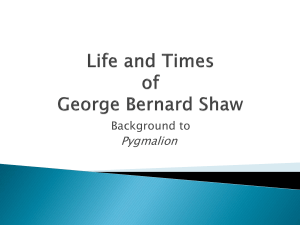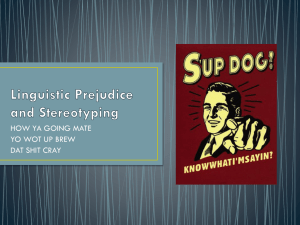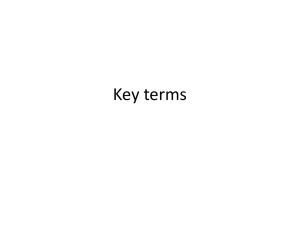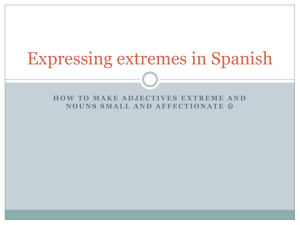Don`t look at me in that tone of voice: discourse accent and linguistic
advertisement
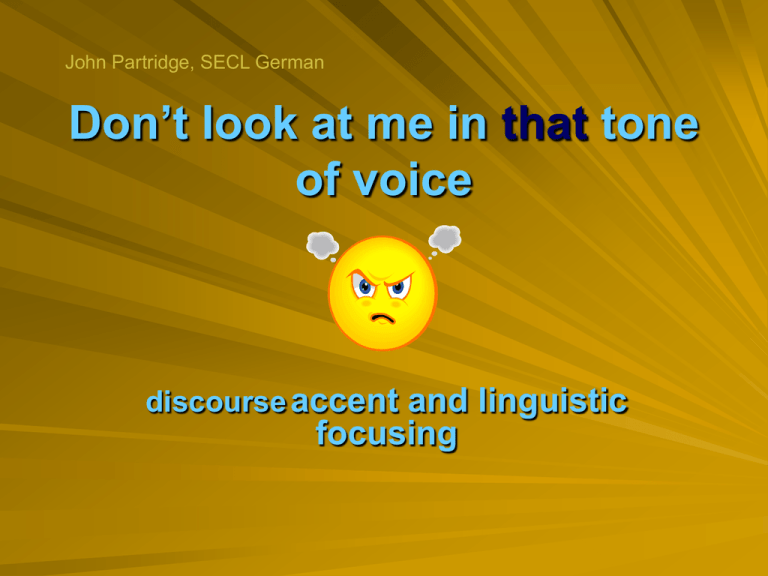
John Partridge, SECL German Don’t look at me in that tone of voice discourse accent and linguistic focusing Some quotes “There’s nothing like quality – and this is nothing like quality.” (anon., but unfortunately true) “You really speak a most excellent accent without the slightest English” (George Mikes: How to be a Brit. Stress & Accent 1 What is stress? The varying degree of emphasis placed on particular syllables in a word: essentially invariable, except in word-play. He didn’t frustrate the cat: he castrated it. Cricket: ‘Catch it! vs ‘cat ‘shit Mechanics: ‘Ratchet vs ‘rat ‘shit Stress: examples into’nation: undisputed stress pattern BUT ‘controversy con’troversy contro’versy No agreed orthodoxy - source of bitter dispute However - no meaning shift Stress and Accent 2 What is accent? Emphasis placed on a particular word or expression used in an utterance. The word or expression retains its stress pattern. What does it do? It focuses attention on that particular part of the utterance Ambiguities and meaning shift sleeping ‘partner vs ‘sleeping partner Taliban ‘fighters – vs ‘Taliban fighters Accent again How do we recognise it? There is no particular and exclusive form, but we seem to perceive it intuitively: Loudness Pitch change Pause Information, Intonation and Contrastive Stress Concept of Head of Phrase: given material, no particularly obtrusive accentuation New material may be markedly accented to focus on a particular element Contrastive stress: contrast with what? Not necessarily binary: me versus the rest Misplaced accent? ‘royal editor vs royal ‘editor the ‘village pump vs the village ‘pump (German/American accentuation?) It’s really the rich European ‘clubs which will benefit (Today Programme, BBC Radio 4, 5/10/06, reporting on the drain of talent from Brazilian football clubs) She sits there … in her ‘matching suit Life as a ‘city clerk A classic of focusing and presupposition “Tony called Harriet a Socialist, and then she insulted him” (original template attributed to George Lakoff, instigating the Generative Semantics debate) cf. “Tony called Harriet a Socialist, and then she insulted him” The role of context in discourse focussing and grammatical process Is focusing only done by accent? J.L. Austin (1962) How to do Things with Words identifies illocutionary acts which make explicit and focus on the speaker’s intention (leads to the Performative hypothesis) I promise to buy you a bunch of red ribbons Accent and Words 1 English conveys much discourse meaning by tone of voice, but It is often difficult to identify intonation in written text Where did you get that hat ? I do like to be beside the seaside Spot the difference? Accent and Words 2 German uses modal particles to convey much discourse meaning: Following Moulton(1962) The particle doch is used to focus on the following word and indicate a yah-boo attitude to a previous speaker’s utterance. Er ist doch gekommen. Well, he came (he was a waste of space once he got here, but at least he was there) Chickens and Eggs 1 Claim by Bolinger, Chapman, Blakemore et al: accent is non-linguistic, and overlaid on a preexistent sequence of words, i.e. paralinguistic. Does para- = non-? English makes extensive use of intonation to focus. German appears to use modal particles to focus. Does English lack words and German tone of voice? What came first? Chickens and Eggs 2 I do like to be beside the seaside ??? I do like to be beside the seaside Relative clauses in English: Restrictive and nonrestrictive The deputy Prime Minister who expressed a passion for melons was on the skids. Restrictive: Which one? The deputy Prime Minister, who expressed a passion for melons, was on the skids. (Rising intonation before commas) Non-restrictive: So what? He likes eggs on his suit too. Hühner und Eier 1 German modal particles Er ist doch gekommen. At least he came (which is more than anyone else did) Er ist doch gekommen. He really did come. (So there!) Er ist doch gekommen. He did come after all (despite the doubt he wouldn’t). Er ist doch gekommen. Well, he came. (He was a waste of space once he got here, but at least he was there.) Acccentuation effects meaning change in particle Hühner und Eier 2 German relative clauses No formal distinction between restrictive and non-restrictive Mit dem Vizekanzler, der sich besonders für Melonen interessierte, ging es steil abwärts. No change in intonation contour, commas obligatory. No differentiation in meaning – has to be done with different determiner, possibly with accentuated gender/case prefix; Mit demjenigen Vizekanzler, der sich besonders für Melonen interessierte, ging es steil abwärts. Non-restrictive: No change in intonation contour (but maybe pauses), commas obligatory. Chicken omelette Both English and German use words and accent to focus, but to varying degrees. However, not complementary distribution Arguments English emphatic do is unacceptable if not accented, therefore must be inserted into sentence so that it can be accented. German particles change meaning when accented, must therefore be inserted with accent. Relative clauses: English accentuation signifies different meaning. German must insert accentuated particle to make a distinction. So what now? Is accent accidental? What triggers it? Context – what is it? Discourse history Co-text – preceding dialogue and linguistic forms Discourse intention of participants “Mutual knowledge” of participants “Shared knowledge” of participants Use of accent: example types Addition Enumeration Modality Negation VERUM-Fokus Prepositions Prefixes Accent in Action 1 Addition: Also/ in addition, I’d like to stress that Außerdem möchte ich betonen Enumeration Fourthly, ... Und viertens … Accent in Action 2 Modality (somewhat variable, doesn’t always work): I must say that’s the giddy limit, old chap ?Ich muss sagen, das ist doch der Gipfel, mein Freund That can’t be right Das kann nicht stimmen I can promise you I’ll be there ?I can promise you I’ll be there Accent in Action 3 Negation That’s not right Das stimmt nicht We don’t do that Das machen wir nicht Accent in Action 4 VERUM-Fokus We don’t do that Das machen wir nicht Accent in Action 5 Prepositions He wasn’t lying on the bed: he was lying under the bed Er lag nicht auf dem Bett, er lag unter dem Bett. Prefixes (wordplay) Als Franz-Josef umgebracht wurde, waren viele Leute aufgebracht. When Franz-Josef was killed, many people were outraged You thought this was going to be a popular lecture: we’ll, it’s turning out to be pretty unpopular
